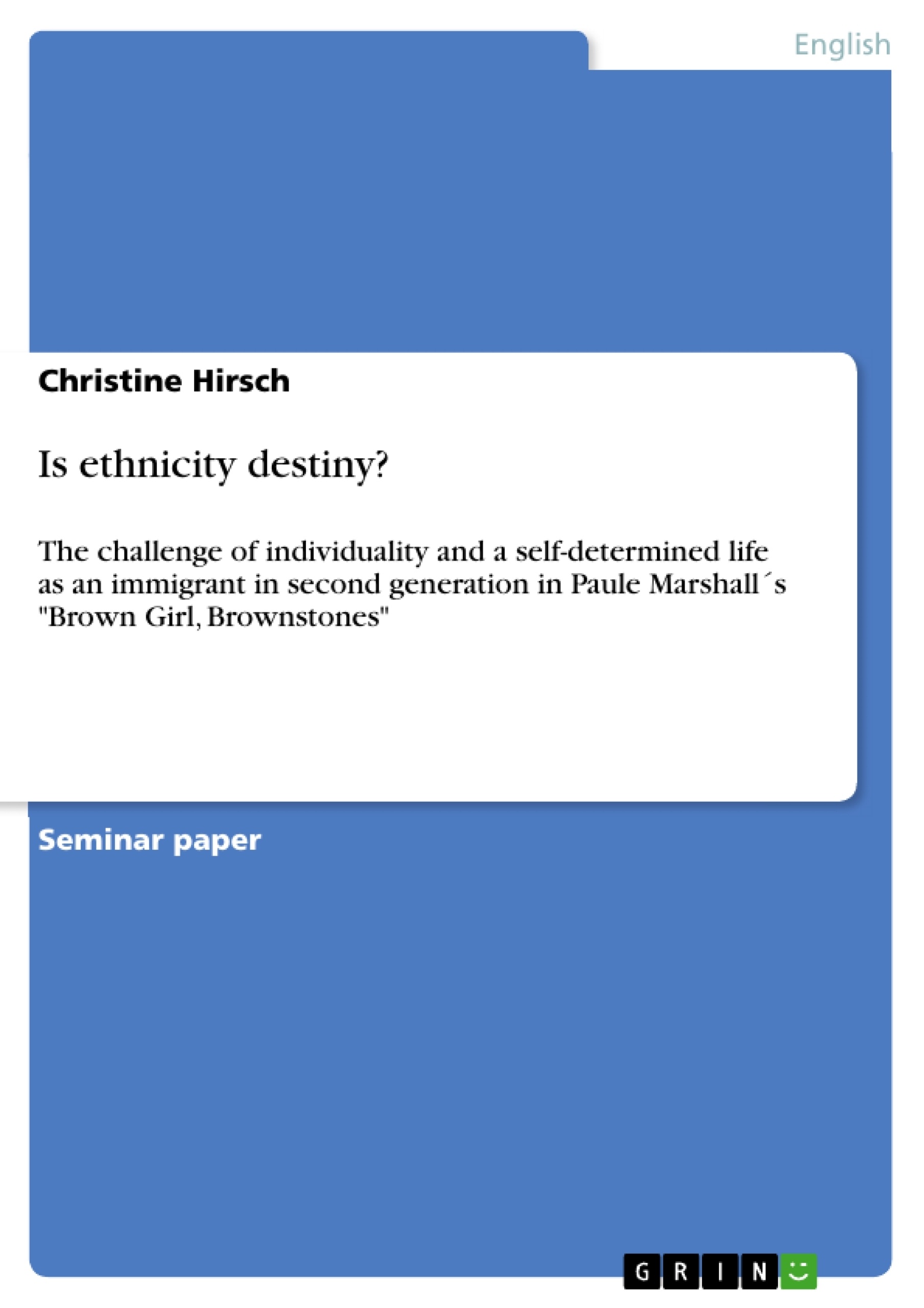“Know who you are and you know what to do!” (Japtok 305). But if you do not know who you are, you will not know what to do. This is what characterizes Selina Boyce, the protagonist in Paule Marshall´s Brown Girl, Brownstones who displays the difficulties that emerge for an individual who lives between two cultures. Born and raised in New York City during the interwar years, she is an immigrant in second generation from Barbados. On the one hand her family is not able to give her the feeling of belonging to anywhere, which is caused by her parents´ different ideas of the American Dream. On the other hand she experiences the fact that within the Barbadian society she is only accepted if she follows certain prescribed ethnic convictions towards life in gen-eral. Furthermore, she realizes that she has to confront racism within American society, which restricts her in her personal development. The unique position of the second generation immigrants can either be a positive and fulfilling experi-ence or a negative one, depending on how those immigrants confront their situ-ation. The individuals have to make a decision from different options presented to them. Typically they incorporate themselves into one of the two cultures and reject the other or they accept what is best from both cultures and create a new consciousness, a new identity. Selina, however, is neither able to find her iden-tity as a Barbadian immigrant nor as an American which eventually leads to an inner and external resignation. After all she recognizes that the only possibility to find her identity is to distance herself from her environment. The protagonist Selina Boyce displays the challenge of finding an identity which immigrants in second generation have to face. Nonetheless, she seeks to find her identity on her own and rejects people who try to determine her identity by prescribed ethnic norms or by prejudices.
Inhaltsverzeichnis (Table of Contents)
- Introduction
- The protagonist's differentness as a symbol for her individuality
- Ethnic norms of Barbadian society in New York City
- Selina's rebellion against communally prescribed ethnic norms
- Selina as an untypical representative of the second generation
Zielsetzung und Themenschwerpunkte (Objectives and Key Themes)
This text examines the challenges faced by second-generation immigrants in finding their identity, using the character of Selina Boyce from Paule Marshall's novel "Brown Girl, Brownstones" as a focal point. The text analyzes how Selina's unique position as a child of immigrants leads to a struggle for self-definition, grappling with cultural expectations and societal pressures.- The struggle for identity in second-generation immigrants
- The impact of ethnic norms on individual development
- The influence of cultural expectations on self-perception
- The role of the American Dream in shaping immigrant aspirations
- The portrayal of individuality and rebellion against societal norms
Zusammenfassung der Kapitel (Chapter Summaries)
Introduction
This chapter introduces Selina Boyce, the protagonist of Paule Marshall's "Brown Girl, Brownstones," and her struggle for identity as a second-generation immigrant in New York City. The chapter highlights the conflicting cultural influences Selina experiences, from her family's Barbadian heritage to the pressures of American society.The protagonist's differentness as a symbol for her individuality
This chapter analyzes Selina's unique personality and appearance, contrasting her with her sister and highlighting her individuality. It examines how the author uses Selina's "differentness" to foreshadow her later rebellion against societal norms.Ethnic norms of Barbadian society in New York City
This chapter explores the ethnic norms that characterize Barbadian society in New York City, specifically their emphasis on materialistic values as a means of achieving the American Dream. The chapter examines the "Association," an organized Barbadian community, and its role in providing loans to immigrants striving for economic security.Schlüsselwörter (Keywords)
The text explores the themes of identity, individuality, ethnicity, cultural norms, second-generation immigrants, the American Dream, and the impact of societal pressures on individual development. Key concepts discussed include ethnic norms, materialist values, the "Association" of Barbadian immigrants, and the unique challenges faced by individuals caught between two cultures.Frequently Asked Questions
What is the central theme of "Is ethnicity destiny?"?
The text explores the identity struggle of second-generation immigrants, specifically focusing on Selina Boyce in Paule Marshall's novel "Brown Girl, Brownstones."
What challenges does Selina Boyce face in New York?
Selina is caught between two cultures: her family's Barbadian heritage with its strict ethnic norms and the reality of racism and social pressure in American society.
How does the Barbadian community in NYC influence Selina?
The community, represented by the "Association," emphasizes materialistic values and specific ethnic convictions as a means to achieve the American Dream, which Selina rebels against.
Why is Selina considered an "untypical" representative of the second generation?
Unlike others who might fully assimilate or strictly follow their heritage, Selina seeks her own identity by distancing herself from both environments to find self-definition.
What role does the American Dream play in the narrative?
The American Dream is portrayed through the parents' differing ideas and the community's drive for economic security, which shapes the expectations placed upon the children.
What does Selina's "differentness" symbolize?
Her unique appearance and personality symbolize her individuality and her refusal to be defined by prescribed ethnic norms or societal prejudices.
- Citar trabajo
- Christine Hirsch (Autor), 2013, Is ethnicity destiny?, Múnich, GRIN Verlag, https://www.grin.com/document/265721



